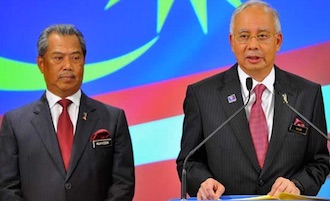Can Malaysia’s Prime Minister Survive?
It is one thing for the Prime Minister of Malaysia and President of UMNO to pick off his rivals within or without UMNO one at a time. But it is altogether a different ball game when the Rakyat, the opposition parties and significant segments of UMNO are united in scalping the Prime Minister’s head.
FORBES
The President of the United Malays National Organisation (UMNO) is always the Prime Minister of Malaysia. It is UMNO who decides who becomes the Prime Minister of Malaysia. Leadership crisis in UMNO always has serious implications to national leadership and Malaysia.
The leadership crisis within UMNO occurs almost every decade. The outcomes of these leadership crisis are balanced as the context is important in determining the survival of the incumbent.
The first leadership crisis happened almost as soon as UMNO was established. Leaders from UMNO’s Islamic Department left in 1951 to form the Pan Malaysian Islamic Party of Tanah Melayu, now known as the Pan Malaysian Islamic Party or PAS. Then, this group argued for the centralisation of Islamic affairs, something that the then leaders of UMNO were not prepared to do. The incumbent was not challenged directly and survived.
The second leadership crisis was the resignation of Dato’ Onn Jaafar (father of Malaysia’s third prime minister and grandfather to Hishammuddin Hussein Onn, a potential future prime minister), the prime mover behind the formation of UMNO and its first president. He resigned as president when his attempts to promote greater inter-racial cooperation to gain independence from the British were opposed by certain key leaders in UMNO. Tunku Abdul Rahman stepped in and led UMNO to greater heights albeit with the principle of UMNO as first among equals. The incumbent was not challenged directly but chose to resign.
The third leadership crisis was the “palace coup” within UMNO. A poor showing by UMNO in the 1969 elections lead to a pogrom against Malaysian Chinese as segments of the Malay community vented their anger at the Malaysian Chinese minority in selected locations. The numbers are disputed but at least some 6,000 Chinese homes and business were destroyed and 184 were killed. Tun Abdul Razak (the father of the current prime minister) took over as prime minister replacing the liberal Tunku Abdul Rahman. A new “more assertive” Malay leadership group replaced the old “more accommodating” one. This “new leadership” included Tengku Razaleigh Hamzah, Musa Hitam and Dr. Mahathir Mohamed, launched the New Economic Policy (NEP) – an extensive affirmative action policy which covered all aspects of the Malaysian economy and society – aimed at reducing socioeconomic disparity between the ethnic Chinese minority and the Malay majority on the Peninsula as well as the indigenous communities of Sabah and Sarawak collectively termed Bumiputera (“sons of the soil”). The incumbent was forcefully removed.
The fourth leadership crisis came about when a rival faction – led by Tengku Razaleigh Hamzah and Musa Hitam – almost succeeded in toppling then incumbent President of UMNO and Prime Minister of Malaysia, Mahathir Mohamad in the 1988 party elections. Mahathir Mohamad then purged the leadership of the government and party of his challengers which included more than half the cabinet members (including Abdullah Ahmad Badawi, Malaysia’s fifth prime minister. Anwar Ibrahim, Najib Razak and Muhyiddin Yassin sided with Mahathir). In the post party election tussle, the High Court declared UMNO to be an “unlawful society” following irregularities in the party elections that Dr Mahathir had just won narrowly. Dr Mahathir then founded a new party called UMNO Baru (New UMNO) with all the institutional resources of the old UMNO. The purged members would form a new political party called Semangat 46 in 1989. In 1990, at the 8th general election, for the first time in Malaysian history, two formal opposition coalitions would be formed to take on the BN. Members of Semangat 46 disbanded in 1996 to return to UMNO. But the idea of opposition parties collaborating with dissidents from the ruling party and receiving strong support from the electorate was now a reality. The incumbent was challenged directly and survived.


